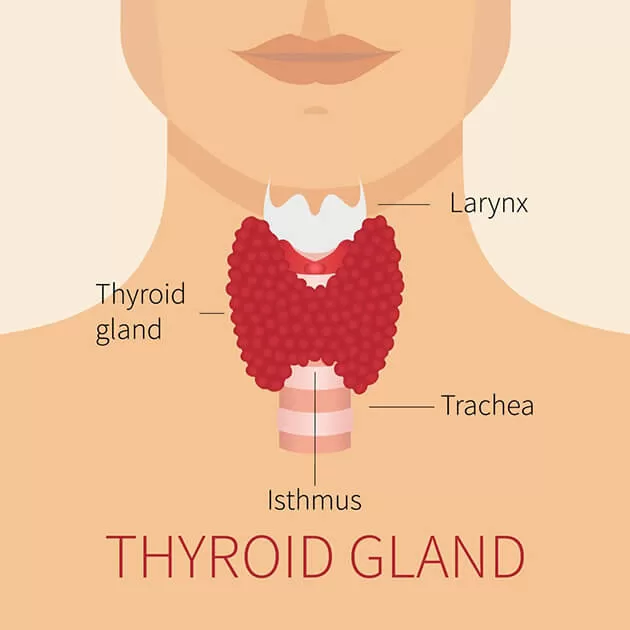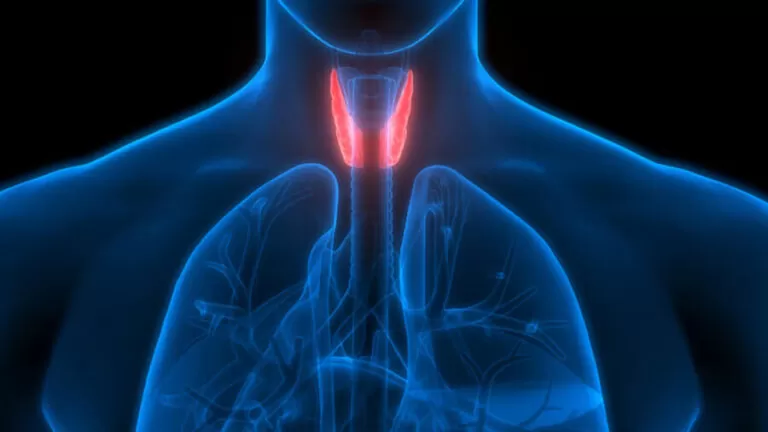The thyroid gland produces thyroid hormone, which helps regulate the body’s metabolism. This hormone also works with other glands in the body to help you stay healthy and maintain a steady heart rate, along with many other tasks related to keeping your body functioning properly.
But what exactly does the thyroid do? It’s made up of two lobes that are located in the front of your neck and sits just below your Adam’s apple (or in front of it). It’s part of your endocrine system, which means it produces hormones that affect how you grow and develop.
A Quick Tour of Your Endocrine System
Your endocrine system is made up of glands (located throughout your body) that produce hormones. All of these glands, along with their hormones, are regulated by one another to keep your body running smoothly. When something goes wrong with one gland or its hormone, it can have a domino effect on other parts of your body.
For example, an overactive thyroid produces too much thyroid hormone and triggers hyperthyroidism. The adrenal glands also play a role in regulating thyroid function—the adrenals secrete cortisol when there’s too much-circulating thyroxine, which helps restore balance within the body.
What Is The Thyroid Gland And What Does It Do?
Located at the base of your neck just below your Adam’s apple, the thyroid gland is a small, butterfly-shaped gland that produces hormones that regulate the body’s metabolic rate, it also includes heart rate and body temperature, and some other physical development. It secretes thyroid hormone, which is responsible for regulating several processes in your body, such as how quickly you burn calories and how much energy you have.
In addition, it has an impact on your mood, metabolism, and weight. When there are issues with your thyroid gland, it can lead to a condition known as hypothyroidism or an underactive thyroid.

How Do I Know If My Thyroid Hormone Is Acting Up?
There are several ways that you can tell if your thyroid is acting up. These include losing weight for no reason, a drop in hair quality or quantity, tingling hands and feet and heart palpitations. Most of these symptoms are due to low levels of thyroid hormone, which can be easily treated with a simple drugstore test.
If you think that you may have symptoms of an underactive thyroid gland, it’s important to talk to your doctor about it as soon as possible. A lot of people don’t realize they have hypothyroidism until their conditions become more severe.
It will take time for you to get used to treatment and make changes in your lifestyle to bring your thyroid back into normal range.
What Are The Different Types Of thyroid hormone?
Hypothyroidism is commonly known as low thyroid hormone, which is associated with symptoms like weight gain, depression, hair loss and dry skin. The most common cause of hypothyroidism is Hashimoto’s thyroiditis, which is an autoimmune disease that attacks your thyroid gland.
Other conditions can cause hypothyroidism such as surgical removal of part or all of your thyroid gland (thyroidectomy), radioactive iodine treatment for hyperthyroidism or other medicines that can suppress hormone production in your body.
How Can I Prevent Or Fix Hypothyroidism And Hyperthyroidism?
Many people suffer from hypothyroidism and hyperthyroidism. Here are some natural ways you can prevent or fix these conditions. First, eat foods that contain iodine in moderation. A diet low in iodine is often a cause of hypothyroidism, since it takes iodine to create thyroid hormone.
Sea vegetables, like kelp and nori, contain high amounts of iodine. Secondly, avoid sugar at all costs—it feeds infections that inhibit thyroid function but also starves your body of nutrients necessary for healthy thyroid function (like chromium). Also stay away from synthetic selenium supplements; they have been shown to inhibit proper thyroid hormone production.





[…] utilization or storage interferes with impaired liver function hypothyroidism, drugs, or radiation […]
[…] illnesses, such as type 1 diabetes, hyperthyroidism, and TB, are linked to being underweight. It’s possible that those with liver or digestive […]
[…] low in fat diet and high in fiber has been shown to help manage symptoms of hypothyroidism. A diet low in fat may also reduce cholesterol levels, which could improve your risk for heart […]
[…] the guidance of a certified dietician. For more details on improvements of thyroid function, and to know everything about thyroid hormone, read the article tagged […]
[…] addition, if patients take too little medication and have symptoms of hypothyroidism, they may wish to raise the dose. This can be done cautiously, under supervision, and TSH levels […]